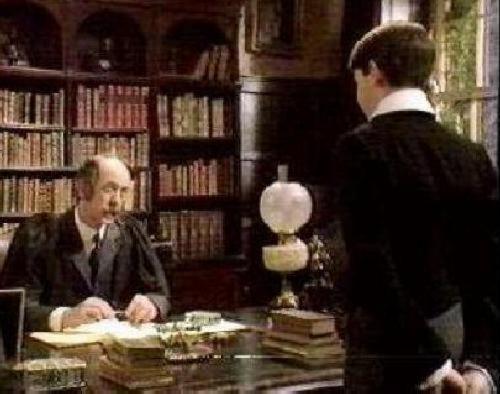
Figure 2.--The Eton collar was standard at many British schools in the late 19th and early 20th century. This is a scene from the 1984 production.


Figure 2.--The Eton collar was standard at many British schools in the late 19th and early 20th century. This is a scene from the 1984 production. |
The English film Goodbye Mr. Chips is perhaps the most well known of all school accounts. Interestingly, the plot is about a
public (exclusive private school) which even few English boys are able to attend. A much loved master at a public school
decides to retire. The story opens in the 1930s, hence the more modern' school uniforms in some scenes. Then flashbacks the
us back to the late Victorian era when Arthur Chipping begins teaching and Eton suits are de rigeur for pupils. Chips moves
from an idealistic young master who cannot control the boys to crabbed old retired beak who knows every nook nd cranney of
the adolescent mind. The various filmed productions are based on the novel by James Hilton.
Goodbye Mr. Chips was based upon James Hilton's short novel published in 1934. It was of the same name, first published in the British Weekly
and subsequently in The Atlantic Monthly [April 1934]. One source tells me that the book was based on the author's personal experiences as a senior classics master at a public school in Cambridge. Donat was from Manchester, James Hilton's father taught in Leigh. A reader tells me that Chips was a composite character based on Hilton's father and a master who taught Hilton at his boarding school. [HBC note: the curriculum at public schools in the 19th century was centered on the classics, the study of Latin and Greek and great works in those languages. Modern topics like science were given little attention]
Goodbye Mr Chips is perhap the best of many novels about English public schools. It chronicles the teaching career of a classics master at a prestigious public (exclusive private boys') school spanning over 60 years. The story shows how a dedicated but in experienced young master at first has trouble contolling his clases. He bcomes a strict, rather humorlous teacher. The scholarly newcomer soon is seen as a martinet of a teacher as he gains control over his classes. He is hurt that his students do not like him, but refuses to change his approach. He becomes an unpopular, demanding and unsympathetic teacher. After many years at the school, he finally learns to understand his studnts through the tenderness of a young wife. Although the repressed teacher loses his sparlking wife, who briefly brightened his life, in a tragic accdent, her legacy inspires him to develop a more personal relationship with his charges. Disappointed in his aspirtations to become headmaster he eventually achieves his goal.
HBC knows of three major film versions made of Goodbye Mr. Chips, two movies and a TV production. All three followd James Hilton's book fairly faithfully.
The first film version of Goodbye Mr. Chips was released in 1939 and is classic British film. A stern, but dedicated English schoolmaster's marriage gives him a new outlook on life and his students. Rather well done movie, with quite a few boys, although few have extensive parts. There are some nice uniforms with caps and
blazers, but all the boys wear long trousers.
The musical remake of the 1939 film with music and lyrics by Leslie Bricusse appeared in 1969. Very well done remake of the original with Peter O'Tool. This was a big-budget Hollywood film and th most elaborate of the Goodbye Mr. Chips productions. An excellent movie with lots of boy intereting charactr. They all wear longs at the schoolThe songs included: Roll call, Fill the world with love, Would I had lived my life then, Schooldays, That's a boy, Where did my childhood go, Boring,
Take a chance, Walk through the world, When I am older, The miracle, A day has a hundred pockets, You and I, What a lot of flowers, When I was younger, Goodbye Mr. Chips, London is London, and And the Sky Smiled. The musical did not prove a great success and the songs are little remembered today.
A much loved master at a public school decides to retire.
The BBC produced an excelent version of Goodbye Mr Chips.
The story opens in the 1930s, hence the more modern' school uniforms in some scenes. Then flashbacks tke us back to the late Victorian era when Arthur Chipping begins teaching and Eton suits are de rigeur for pupils. Roy Marsden plays Chipping and ages very convincingly from
idealistic young master to crabbed old retired beak. It is based on the novel by James Hilton. The producer was Barry Letts and it was directed by Gareth Davies.
Navigate the Boys' Historical Clothing Web Site:
[Return to the Main "Gm-Gq" movie page]
[Return to the Main school movie page page]
[Return to the Main English movie page page]
[Introduction]
[Activities]
[Biographies]
[Chronology]
[Clothing styles]
[Countries]
[Bibliographies]
[Contributions]
[FAQs]
[Glossaries]
[Satellite sites]
[Tools]
[Boys' Clothing Home]
